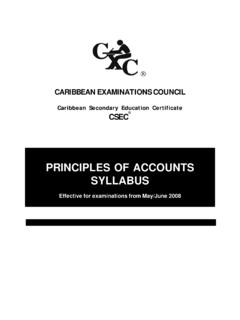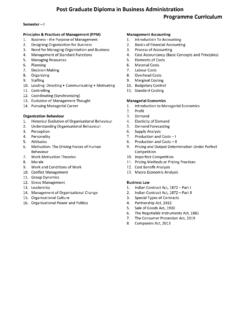Transcription of FCE 372 ENGINEERING MANAGEMENT 1 LECTURE NOTES
1 University of Nairobi Department of Civil and Construction ENGINEERING FCE 372 ENGINEERING MANAGEMENT 1 LECTURE NOTES DR. NYAMBANE OSANO 2013 FCE 372 ENGINEERING MANAGEMENT I OSN - LECTURE NOTES University of Nairobi Page i TABLE OF CONTENTS 1 OVERVIEW .. 1 COURSE DESCRIPTION 1 PREREQUISITE 1 IMPORTANCE OF THE COURSE 1 IMPORTANCE OF THE COURSE 1 TEACHING METHODOLOGY AND TECHNIQUES 1 REQUIRED TEXT BOOKS 1 2 PRINCIPLES OF MANAGEMENT PRACTICE .. 2 ENGINEERING 2 MANAGEMENT 2 ENGINEERING MANAGEMENT 3 EVOLUTION OF MANAGEMENT THOUGHT 3 APPROACHES TO MANAGEMENT 3 MAJOR CLASSIFICATION OF MANAGEMENT APPROACHES AND THEIR CONTRIBUTORS 4 HENRY FAYOL S PRINCIPLES OF MANAGEMENT 5 MODERN MANAGEMENT THEORY 6 SYSTEM APPROACH 7 CONTINGENCY THEORY 8 3 MANAGEMENT FUNCTIONS.
2 9 INTRODUCTION 9 THE FUNCTIONS OF MANAGEMENT 9 PLANNING 9 ORGANIZING 9 STAFFING 9 DIRECTING 10 CONTROLLING 10 4 STRUCTURES OF CONSTRUCTION 11 TYPES OF CONSTRUCTION PROJECTS 11 BUILDING CONSTRUCTION 11 HEAVY / CIVIL CONSTRUCTION 12 INDUSTRIAL CONSTRUCTION 12 CONSTRUCTION PROCESSES 12 FCE 372 ENGINEERING MANAGEMENT I OSN - LECTURE NOTES University of Nairobi Page ii DESIGN AND CONSTRUCTION TEAM 12 financial ADVISORS 12 LEGAL CONSIDERATION 13 INTERACTION OF EXPERTISE 13 PROCUREMENT MODELS 13 TRADITIONAL 14 DESIGN AND BUILD 14 MANAGEMENT PROCUREMENT SYSTEMS 15 CONSTRUCTION CAREERS 15 CONTRACTOR BUSINESS STRUCTURES 16 SOLE PROPRIETORSHIP 16 PARTNERSHIP 16 CORPORATION 16 LIMITED LIABILITY COMPANY (LLC) 16 5 CONSTRUCTION ACCOUNTING METHODS.
3 17 ACCOUNTING METHODS 17 COMPLETED CONTRACT METHOD 17 PERCENTAGE COMPLETION METHOD 17 MISCONCEPTIONS 18 financial STATEMENTS AND THEIR USERS 18 QUALITATIVE CHARACTERISTICS 18 financial INFORMATION 18 INTERNAL USERS 19 EXTERNAL USERS 19 OTHER EXTERNAL USERS 19 CONCLUSION 20 AUDIT, REVIEW AND COMPILATION ENGAGEMENT 20 AUDIT ENGAGEMENT 20 REVIEW ENGAGEMENTS 21 COMPILATION ENGAGEMENTS 21 LINES OF CREDIT, BANK LOANS AND LONG TERM DEBT 21 BOOK-KEEPING 22 WHAT IS BOOK-KEEPING? 22 TYPES OF BOOK-KEEPING SYSTEMS 22 BASIC ELEMENTS OF BOOK-KEEPING 22 THE BOOK-KEEPING EQUATION 23 TYPES OF BUSINESS TRANSACTIONS 23 6 FEASIBILITY STUDIES OF CIVIL ENGINEERING PROJECTS.
4 25 DEFINITION 25 TYPES OF FEASIBILITY STUDIES 25 FCE 372 ENGINEERING MANAGEMENT I OSN - LECTURE NOTES University of Nairobi Page iii TECHNICAL FEASIBILITY 25 ECONOMIC FEASIBILITY 25 OPERATIONAL FEASIBILITY 25 LEGAL FEASIBILITY 25 COST-BENEFIT ANALYSIS 26 OVERVIEW 26 THE PURPOSE OF THE TECHNIQUE 26 IDENTIFYING COSTS 26 IDENTIFYING BENEFITS 27 SELECT EVALUATION METHOD 27 DISCOUNTED CASH FLOW ANALYSIS (DCF) 27 A. PRESENT VALUE ANALYSIS: 27 B. NET PRESENT VALUE (NPV) 28 7 ECONOMICS OF DIRECT LABOUR CONSTRUCTION .. 33 8 CIVIL ENGINEERING CONTRACTS .. 34 DEFINITION 34 ELEMENTS OF A CONTRACT 34 FORMATION OF A CONTRACT 35 TYPES OF CIVIL ENGINEERING CONTRACTS 35 ITEM RATE CONTRACT 36 PERCENTAGE RATE CONTRACT 36 LUMP SUM CONTRACT 36 LABOUR CONTRACT 36 MATERIAL SUPPLY CONTRACT 36 PIECE-WORK CONTRACT 36 COST PLUS PERCENTAGE RATE CONTRACT 36 COST PLUS FIXED RATE CONTRACT 36 COST PLUS FLUCTUATING FEE CONTRACT 36 TARGET CONTRACT 36 9 CONTRACT DOCUMENTS.
5 37 10 TENDERING PROCEDURE .. 38 OVERVIEW 38 BREAKDOWN OF FIDIC TENDERING PROCEDURE 39 11 CIVIL ENGINEERING ETHICS .. 40 INTRODUCTION 40 FCE 372 ENGINEERING MANAGEMENT I OSN - LECTURE NOTES University of Nairobi Page iv PROFESSIONAL AND CHARTERED ENGINEERS 40 CODE OF ETHICS 40 FUNDAMENTAL PRINCIPLES 40 FUNDAMENTAL CANONS 40 WHISTLEBLOWING 41 DEFINITION 41 EXAMPLES OF PROBLEMS THAT MIGHT WARRANT WHISTLE-BLOWING 41 MORAL GUIDELINES TO WHISTLE-BLOWING 41 12 TUTORIALS .. 43 GROUP 1, 2 AND 3 43 GROUP 4 44 GROUP 5 45 GROUP 6 45 GROUP 7 45 GROUP 8 45 GROUP 9 45 GROUP 10 46 GROUP 11 47 GROUP 12 47 GROUP 13 49 GROUP 14 49 GROUP 15 49 FCE 372 ENGINEERING MANAGEMENT I OSN - LECTURE NOTES UNIVERSITY OF NAIROBI Page 1 1 OVERVIEW COURSE DESCRIPTION ENGINEERING MANAGEMENT is a specialized form of MANAGEMENT that is concerned with the application of ENGINEERING principles to business practice; PREREQUISITE None IMPORTANCE OF THE COURSE Engineers find themselves at a decision point typically within 3 to 7 years after graduation.
6 They choose between the technical specialty and technical MANAGEMENT route. According to various studies conducted, it is estimated that more than 75% of engineers choose the technical MANAGEMENT route, and perform MANAGEMENT tasks while maintaining identity in their technical specialties. Despite this phenomenon, engineers are rarely trained for MANAGEMENT responsibilities. This course helps prepare engineers to assume managerial positions within their technical specialty areas. Great deals of industrial executive s top corporate managers have ENGINEERING backgrounds.
7 Today, several universities offer ENGINEERING MANAGEMENT programs/concentrations at the undergraduate and/or graduate level. IMPORTANCE OF THE COURSE To expose ENGINEERING students to managerial concepts and techniques used in the real world by Technical Managers, Project Directors, and other technically oriented MANAGEMENT personnel. To do in-depth analysis of some case studies pertaining to ENGINEERING MANAGEMENT functions. TEACHING METHODOLOGY AND TECHNIQUES This course relies on lectures and Power Point presentation by the lecturer. Tutorials will be offered. Students will then be required to contribute to discussions based on the explanations and will need to read the corresponding section in the assigned textbook.
8 REQUIRED TEXT BOOKS a) ENGINEERING MANAGEMENT by B S, Dhillon, Technornic Publishing Co., 1987. b) Essentials Of MANAGEMENT by Joseph L. Massie, Prentice hall Publishing Co., 4th Edition. c) Managing Projects: A System Approach by Daniel D. Roman, Elsevier Science Publishing CO., 1986. d) ENGINEERING Program MANAGEMENT by Hans J. Tharrihain, John Wiley & Sons, 1984. e) ENGINEERING MANAGEMENT by Cleland and D. E Kocaoglu, McGraw-Hill, 1981. FCE 372 ENGINEERING MANAGEMENT I OSN - LECTURE NOTES UNIVERSITY OF NAIROBI Page 2 2 PRINCIPLES OF MANAGEMENT PRACTICE ENGINEERING Definition; ENGINEERING is the profession in which a knowledge of the mathematical and natural sciences, gained by study, experience, and practice, is applied with judgment, to develop ways to utilize, economically, the materials and forces of nature for the benefit of mankind Types; 1.
9 Agricultural ENGINEERING 2. Architectural ENGINEERING 3. Bioengineering/Biomedical ENGINEERING 4. Ceramic ENGINEERING 5. Chemical ENGINEERING 6. Civil ENGINEERING 7. Computer ENGINEERING 8. Electrical ENGINEERING 9. Environmental ENGINEERING 10. Fire Protection ENGINEERING 11. Industrial ENGINEERING 12. Manufacturing ENGINEERING 13. Mechanic ENGINEERING 14. Metallurgy and Materials ENGINEERING 15. Mineral and Mining ENGINEERING 16. Nuclear ENGINEERING 17. Ocean ENGINEERING 18. Transportation ENGINEERING MANAGEMENT Definition; The word MANAGEMENT originates from Old French m nagement the art of conducting, directing , and from Latin manu agere to lead by the hand ) MANAGEMENT characterizes the process of leading and directing all or part of an organization, often a business, through the deployment and manipulation of resources (human, financial , material, intellectual or intangible).
10 Areas of MANAGEMENT ; Change MANAGEMENT Communications MANAGEMENT Constraint MANAGEMENT Cost MANAGEMENT Crisis MANAGEMENT Customer relationship MANAGEMENT Earned value MANAGEMENT ENGINEERING MANAGEMENT Enterprise MANAGEMENT FCE 372 ENGINEERING MANAGEMENT I OSN - LECTURE NOTES UNIVERSITY OF NAIROBI Page 3 Facility MANAGEMENT Integration MANAGEMENT Knowledge MANAGEMENT Marketing MANAGEMENT Micromanagement Pain MANAGEMENT Perception MANAGEMENT Procurement MANAGEMENT Program MANAGEMENT Project MANAGEMENT Process MANAGEMENT Product MANAGEMENT





